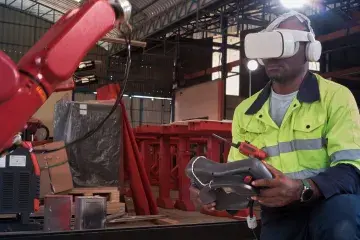
In today’s world where data is ubiquitous and inexpensive, the Department of Homeland Security (DHS) can leverage data science developments across multiple homeland security missions to identify signals, patterns, and structures within high-dimensional, noisy, uncertain input. Data sciences and simulation sciences conduct experiments to predict different operational outcomes. Such research can improve the phenomenology of crowd models, improve tool sets available in cyber analytics platforms, decrease the time needed to develop training data annotations in law enforcement missions, improve air interdiction of drug trafficking, and adapt training according to the trainee’s strengths and weaknesses.
Both data sciences and simulation sciences are increasingly combined with machine learning (ML) approaches. Science-based simulations are relying on embedded ML models not only to interpret results from massive data outputs but also to steer computations. Science-based models are being combined with data-driven models to represent complex systems and phenomena. This research area represents modeling areas of critical importance to DHS that do not fall in classic science-based simulations. These include technologies such as virtualization, game engines, and virtual/augmented reality.
As massive stores and streams of digital data are driving an increasing emphasis on more sophistication at the application level, the importance of an effective data ecosystem is increasingly apparent. It must consist of multiple integrated resources and software services, including resources for managing, processing, analyzing, exploring, and sharing. Data also needs to be discoverable, accessible, reproducible, secure, trusted, and reusable—and management and lifecycle policies are key concerns.
The Science and Technology Directorate’s (S&T) focus areas in data, modeling, and simulation sciences are:
- Advance Data Analytics Capabilities - We aim to improve existing data analytics capabilities and invent or adapt new and emerging capabilities for DHS use.
- Advance Modeling and Simulation Capabilities - We strive to improve existing modeling and simulation capabilities and adapt new and emerging capabilities for DHS use.
- Combine Data Analytics and Simulation Capabilities - We experiment with and understand the limitations of learning models from simulated environments, while exploring model-test-model paradigms.
- Data Ecosystem - We conduct research to increase knowledge and inform best practices for data ecosystems that serve all modeling communities and enable data analytics, simulation and AI applications.
News
- Technologically Speaking Podcast: Representing the Reality of Situations
- Feature Article: Virtual Reality at the Los Angeles Long Beach Seaport
- Feature Article: Helping DHS Mitigate Explosive Threats
- Preparing for the Unlikely
Resources
- Modeling and Simulations Technology Center
- Modeling and Simulations Fact Sheets
- Obtaining Models and Simulations for Radiological/Nuclear Trainings and Exercises Summary
- S&T Technology Centers Division Research Agenda
Contact
Learn more about us and discover how your organization can partner with S&T to make the homeland more secure.
